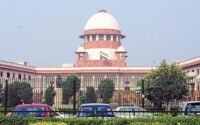Prof. N.R. MADHAVA MENON- Father of Modern Education in India.
This article is written by Shambhavi, a student of Banasthali Vidyapeeth.
Neelakanta Ramakrishna Madhava Menon was brought up by his mother , with the assistance of her brothers and sisters. He was born on 4th May 1935 at Thiruvananthapuram, in the south Indian state of Kerala in a Nair family.
Menon did his schooling at Sreemoolavilasam Government High School , Thiruvanathapuram. He passed matriculation in 1949 and completed the pre-university course in 1950. He did BSc in Zoology and graduated in 1953 from S.D College, Alappuzha. Simultaneously with his graduate studies he also passed the Hindi Visharad course conducted by the Dakshin Bharat Hindi Prachar Sabha. He continued his studies at Government Law College , Thiruvananthapuram and was also the student editor of the college magazine in 1954-55. He passed the law course in 1955.
N.R Madhava Menon started his career in 1955, as a probationer to a parochial known lawyer, V. Nagappan Nair, and accommodated him for thirteen months. He catalogued him at the High Court of Kerala , in Ernakulam in 1956 as a legal practitioner and started practice under advocate Poovanpallil Neelakandan Pillai at the District Court in Thiruvananthapuram. One year later, Menon appeared for the Civil Services Examination and got assigned into the Central Secretariat Service in New Delhi. Menon took up the profession at Central Secretariat in New Delhi on the guidance of his teacher and counsellor, A.T .Markose , the first Director of Indian Law Institute and the author of Judicial Control of Administrative Action in India.
Menon continued his studies at Campus College located at Gole Market , affiliated to Punjab University while working at the Secretariat and also appended a post graduate degree in political science with distinction ,in 1960. For further studies in law Menon adjoined Faculty of Law, Aligarh Muslim University. He proceeded to the master’s degree in law (LLM) , and attaining a UGC endowment , continued research on the topic, White Collar Crime.
He was the first PhD of Faculty of Law , Aligarh Muslim University as he completed his research in 1965. He was first non- Muslim to be appointed as warden of a hostel at Aligarh Muslim University while doing part time job as the warden of the Sir Syed Hall at the university.
In 1968, Menon joined his alma mater, Faculty of Law , Aligarh Muslim University , as a professor. He was the member of the Delhi University panel which interfaced with the universities from the United States such as Harvard , Columbia, Michigan and Yale .
Menon published his first book , Law Relating to Government Control Over Private Enterprise , co- authored by his colleague, G. Narsimhaswamy, published through Eastern Law Book Company. While working in Delhi , he organised the annual conference of the All India Law Teacher’s Association in 1972, where he was appointed as the Secretary General of the Association. In 1980, the Bar Councilo of India decided to inaugurate a new law school. Menon was known to have set up the Bangalore – based National Law School of India University and worked there for twelve years as the director , moving after the institution gained university status.
After retiring from active government service in 2006, Menon was appointed by the Union Government as a member of the Commission on Centre-State Relations, a position he held till 2010. He also served as the Chairman of the Indian Statistical Institute, Kolkata, and later, as the Chairman of the Centre for Development Studies, Thiruvananthapuram. He headed the central government committee constituted to draft the National Policy on Criminal Justice and served as the Commission on Equal Opportunity. He was a member of Law Commission of India and was a member of the Committee on Restructuring of Higher Education in India as well as the Criminal Justice Reform committee
The Government of West Bengal invited Menon to set up the West Bengal National University of Juridical Sciences. He was the first vice chancellor there and held the post till 2003. He also worked s the first director of the newly formed National Judicial Academy , a training centre for judges till his retirement in 2006.
Menon was a member of the Board of Governors of the International Organization of Judicial Trainers (IOJT), was an advisor to the Commonwealth Judicial Education Institute, Canada. He held the chair of the International Bar Association on Continuing Legal Education based at NLSIU and Menon Institute of Legal Advocacy Training (MILAT), a non- governmental organization founded by him in Thiruvananthapuram.
Menon, the president of the Bar Council of India during the period, 1994–98, was conferred the Living Legend of Law Award by the International Bar Association in 1994. He was also a recipient of the Rotary Club Award for Vocational Excellence and the Plaque of Honour from the Bar Council of India.
He received the degree of Doctor of Law (Honoris Causa) from the National Law School of India University in 2001. He was a Fellow of the American Council of Learned Societies and Columbia University. The Government of India included Menon, in 2003, in the Republic Day honours list, for the civilian award of Padma Shri.
Menon’s contributions are known behind the establishment of two law schools in India viz. National Law School of India University, Bengaluru, and the West Bengal National University of Juridical Sciences, Kolkata. He is credited with the conceptualisation of the five-year integrated LLB course, in place of the earlier three-year non-integrated course. His Socratic method of teaching, involving participation of law students in legal clinics, is considered by many as an innovation.
Menon passed away on 8 May 2019 at Thiruvananthapuram, reportedly after battling liver cancer.


